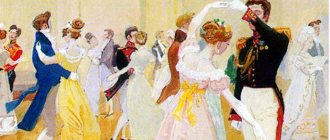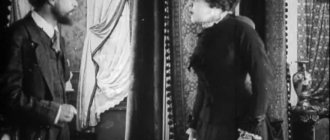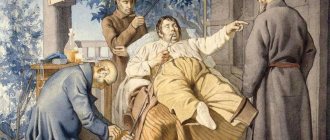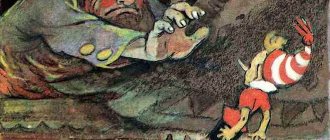History of creation
The story is considered the author's last significant work. Tolstoy included it in his famous cycle, which he completed in 1944.
In addition to this, the collection includes other works:
- “At night in the entryway in the village”;
- “How it began”;
- "Seven grimy";
- "Nina";
- "Strange story."
Typically, military literature contains descriptions of battles or relations between the warring parties. Tolstoy wrote a rather unusual work. It is based on family relationships. There are no characters with negative characters in the story. Almost all the characters are noble, smart and kind.
The entire conflict was contrived by the main character ; the contradictions appeared only in his head. Thanks to this, the work ended happily. But in fact, during the war years, families who were able to live as before after their men returned from the front were not numerous.
Tolstoy knew that many soldiers died or came home crippled physically and mentally. He did not want to describe the horrors of war, which everyone already knew about. A positive story with an interesting plot can be compared to a life raft - the people needed positive thinking against the backdrop of terrible events.
The work is written based on real events . An employee of the Krasnaya Zvezda newspaper told Tolstoy about a tanker who almost burned to death in a tank. The unusual fate of the soldier interested the writer and awakened in him the strength of the Russian spirit.
The author paid much more attention to the experiences of the main character than to the description of military events. Thanks to this technique, the story became interesting for both adults and children.
“Russian character” Summary of Tolstoy’s story
3
(2)
Alexei Tolstoy’s artistic task was to explore those traits of the Russian character that throughout history made it possible to survive and win. The completion of the cycle “Stories of Ivan Sutsarev” (1942-1944) was a story with the significant title “Russian Character” (1944).
An employee of the Krasnaya Zvezda newspaper told Tolstoy about the fate of the tanker, who almost burned to death in the tank. This particular story acquired a general meaning and grew into the writer’s reflections on the strength of spirit of the Russian man, the courage of a soldier, the love of a mother, and the fidelity of a woman.
In the depiction of Yegor Dremov, the typical character of the hero is emphasized first of all. He was, according to the narrator, a “simple, quiet, ordinary” man. He is endowed with the most common biography: before the war he lived in a village, treated his mother and father with respect, worked conscientiously on the land, and now he is fighting heroically. Dremov, like his father and grandfather, bears the name Yegor, which means “cultivator of the land,” and with this detail the author emphasizes the connection between generations and the continuity of the moral values of the people.
It is this “ordinary” person who is aesthetically singled out by the writer from others, placed in circumstances that, despite their reality, cannot but be considered exceptional. Even outwardly, Yegor is especially noted for his heroic build and beauty: “You used to see him crawling out of a tank turret - the god of war! He jumps from the armor to the ground, pulls off the helmet from his wet curls, wipes his grimy face with a rag and will certainly smile from spiritual affection.” The motif of “heroism” is also heard in the story about the deeds of Yegor, who is one of the few! - o (“Golden Star” of Hero of the Soviet Union).
But the main thing in the story is not the combat episodes with the participation of Lieutenant Dremov (they are shown in the presentation of other characters). At the center of the work is a seemingly personal situation related to the hero’s experiences after being seriously wounded during a tank battle on the Kursk Bulge.
Dremov's face was almost completely burned, and his voice changed after the operations. A number of details emphasized by the author make it possible to show the process of exposing the deep essence of character. Yegor has lost his external attractiveness (the motif of “ugliness” in the second part of the story varies in the instinctive reaction of people to the appearance of the burnt tanker). But the more clearly the inner beauty and strength of the hero manifests itself.
It is in the desire to remain in the ranks, in the real military brotherhood that connects Yegor with his comrades in arms, in his love for his loved ones and care for them.
The culmination of the story was the scene in his home, when the dearest people did not recognize Yegor in a man with a disfigured face, and he decided not to be a burden to them with his misfortune and called himself by someone else’s name. But now his relatives are teaching Yegor a lesson in true humanity and love. A mother who felt in her heart that it was her son who was in his home.
The father, as always, laconicly said the main thing: “We need to be proud of a face like this one who came to us” (the epithet “fair” used in relation to the father is not accidental). Katya Malysheva, who forever linked her life with Yegor (“beautiful Katya,” whose image emphasizes the harmony of internal and external). “Yes, here they are, Russian characters! It seems like a simple person, but a severe misfortune comes, in big or small ways, and a great power rises in him - human beauty.”
These words, which conclude the story, sum up the emotional conclusion of Tolstoy’s thoughts about the Russian character, the artistic study of which the writer conducted throughout his life.
3 / 5. 2
.
Main characters
In Tolstoy's story "Russian Character" the main characters are distinguished by their good character and positive qualities. They adapt to different events, but at the same time remain humane. Main characters:
- Egor Dremov;
- Chuvilev;
- Egor Egorovich;
- Maria Polikarpovna;
- Katya Malysheva;
- Ivan Sudarev.
One of the main characters of Tolstoy’s “Russian Character” is tanker Yegor Dremov. He took part in the battle on the Kursk Bulge and almost died. His tank was practically burned, and the soldier himself received serious burns. Driver Chuvilev helped him get out.
Dremov returned home, but refused to admit to his parents that he was their son . With his face burned, no one recognized him. But Maria Polikarpovna and Yegor Yegorovich - the tanker’s mother and father - were not worried about his appearance. They were glad that their son returned alive, because many of their neighbors received news of the death of their children.
The mother is proud of Yegor’s actions, because he behaved courageously on the battlefield, and the father believes that such a face speaks of accomplished feats. A person may be ugly on the outside, but his inner beauty covers up any scars. His behavior on the battlefield only inspires respect, because Yegor is one of the few soldiers who is a Hero of the USSR.
Katya Malysheva - tankman's bride . She promised to wait for him from the front and remain faithful, and the girl kept her word. When she found out that the burned young man was her fiancé, she agreed to marry him. Katya was devoted to Yegor until her death; she considered him a real hero and a brave man.
The narrator of the work is the tanker's friend Ivan Sudarev. He is a friendly young man with a reasonable and reserved character.
It was he who assessed the actions of all the heroes and observed their relationships. Ivan was interested in human nature and its manifestation in different situations.
Climax
The climax scene is the brave warrior’s arrival home on leave after the hospital. A meeting with his father and mother, with his bride - with the closest people in his life, turned out not to be a long-awaited joy, but to bitter inner loneliness. He could not, did not dare to admit to his old parents that the man standing in front of them with a disfigured appearance and an alien voice was their son. You can’t let your mother’s old face tremble desperately. However, there was a glimmer of hope in him that his father and mother themselves would recognize him, guess without explanation who had come to them, and then this invisible barrier would be broken. But that did not happen. It cannot be said that Maria Polikarpovna’s maternal heart felt nothing at all. His hand with a spoon while eating, his movements - these seemingly smallest details did not escape her gaze, but she still did not guess. And here Katerina, Yegor’s fiancée, not only didn’t recognize him, but at the sight of the terrible face-mask, she leaned back and got scared. This was the last straw, and the next day he left his father's house. Of course, there was resentment, disappointment, and despair, but he decided to sacrifice his feelings - it was better to leave, to isolate himself, so as not to frighten his nearest and dearest. Summary of Tolstoy’s “Russian Character” does not end there.
Beginning of the work
For the reader's diary, you can read the summary of “Russian Character”. Tolstoy begins his story by describing the life of the main character before the war. Yegor was an ordinary person with a quiet character. He lived in a village, treated his parents with respect and was engaged in farming.
The young man was named after his father, although his grandfather also had the same name. It means “cultivator of the land,” which corresponded to the family’s occupation. The moral values of different generations were the same.
Yegor was a handsome young man with a heroic physique. He was not afraid of physical labor and endured all the difficulties of rural life. The guy had a girlfriend, Katya. The lovers planned to get married soon.
But the war began, Yegor was taken to the front . His comrades admired his beauty, courage and simple Russian character. The guy talked a lot about his parents and Katya, and missed them very much.
During the war, the young man accomplished several feats, but was not proud of them. He was naturally modest, so he hid his awards. The story that happened to Yegor was learned by his comrade from other soldiers.
During the next battle, the young man’s tank was knocked out. The driver managed to pull him out of the fire, almost sacrificing himself. Egor received serious burns and his face was badly damaged. Doctors managed to save his vision, but failed to restore his former features. The soldier had to undergo numerous plastic surgeries. Burns and new scars did not add to his attractiveness - from a handsome young man he turned into a freak.
Although Yegor received the rank of lieutenant and Hero of the USSR, they wanted to send him home. The guy refused to leave the front and decided to stay in the regiment. Instead, he was given 20 days leave to visit his parents and his beloved Katya.
Theme and idea of the story
From the first lines, the author indicates the theme of the story. Of course, we will talk about the Russian character. Quote from the work: “I just want to talk to you about the Russian character...” And here we hear notes not so much of doubt, but rather of regret that the form of the work is so small and limited - a short story that does not correspond to what the author has chosen scope. And the topic and title are very “meaningful”. But there is nothing to do, because I want to talk...
The ring composition of the story helps to clearly clarify the idea of the work. Both at the beginning and at the end we read the author’s reflections on beauty. What is beauty? Physical attractiveness is clear to everyone, it is on the very surface, you just have to stretch out your hand. No, she is not the one who worries the narrator. He sees beauty in other things - in the soul, in character, in actions. It especially manifests itself in war, when death is constantly around. Then people become better, “every kind of nonsense, husk, peels off from a person, like skin that has become dead after a sunburn,” and does not disappear, and only one thing remains - the core. It is clearly visible in the main character - in the silent, calm, strict Yegor Dremov, in his elderly parents, in the beautiful and faithful bride Katerina, in the tank driver Chuvilov.
The denouement of the story
Yegor did not want to return home. He was afraid to show himself to his parents and fiancee. But still I had to go. The guy called his parents a friend of their son and began talking about his own exploits.
At home they greeted him politely and were glad that their son was alive and was behaving bravely on the battlefield. But the mother suspected that the young man who came to them was Yegor. The woman’s heart could not deceive, because she felt her own child. My father was very proud that his only heir achieved great success, performed great feats and was respected by his comrades.
The next morning Katya came to the Dremovs' house . At first the girl was frightened by the appearance of the guest. But then she started talking to him and was happy about the news about Yegor. She promised to continue to wait for him after the war and confessed her feelings.
Yegor himself watched his parents and bride with longing. He didn’t want to be a burden to them, to scare them, so he decided to leave home forever. The lieutenant returned to the front again, trying to forget about his native village.
But Maria Polikarpovna could not find a place for herself. She felt that it was Yegor who came to them. Neither his appearance nor his changed voice repelled his mother’s heart. The woman decided to write a letter to her son. She asked him directly what happened to him, whether he had recently come home.
His mother told Yegor that she was proud of him and did not care about his disfigured appearance. The laconic father also advocated for his son to return home. He believed that a guy should be proud of his burned face, because the scars speak of his valor.
Yegor finally returned home and confessed everything to his parents. Most of all, he was afraid of meeting his bride. Katya was a beautiful girl with a kind disposition. But she did not give up on him, because she loved him very much. The girl replied that she agreed to stay with him for the rest of her life, because his feelings were important to her, not his appearance.
The protagonist's internal conflict did not affect his surroundings. His close friends, parents and fiancée did not abandon him because of his ugly appearance. This is where the true Russian character is manifested - spiritual beauty overshadows external qualities.
Alexey Tolstoy, “Russian character”: analysis of the work
During the war, Alexey Tolstoy creates an amazing collection “Stories of Ivan Sudarev”, consisting of seven short stories. All of them are united by one theme - the Great Patriotic War of 1941-1945, one idea - admiration and admiration for the patriotism and heroism of the Russian people, and one main character, on whose behalf the story is told. This is an experienced cavalryman Ivan Sudarev. The last story, which completes the entire cycle, is the story “Russian Character”. Alexei Tolstoy, with his help, summarizes what was said earlier. It is a kind of summary of everything that was said before, all the author’s reasoning and thoughts about the Russian person, about the Russian soul, about the Russian character: beauty, depth and strength are not “a vessel in which there is emptiness”, but “a fire flickering in a vessel."






